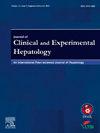Predictors of Non-response to Atezolizumab Plus Bevacizumab in Patients With Unresectable Hepatocellular Carcinoma: A Multicentre Real World Study (HCC-AB Study)
IF 3.3
Q2 GASTROENTEROLOGY & HEPATOLOGY
Journal of Clinical and Experimental Hepatology
Pub Date : 2025-02-08
DOI:10.1016/j.jceh.2025.102513
引用次数: 0
Abstract
Background
The approved immunotherapies for patients with advanced HCC are Atezolizumab and Bevacizumab. However, patients in India present late and healthcare is often available through self-financing. To rationalise the therapy, we conducted a large multicentre study to identify the baseline predictors of non-response to atezolizumab and bevacizumab in advanced unresectable HCC.
Methods
A dose of atezolizumab 1200 mg and bevacizumab 15 mg/kg was used every 3 weeks from 6 centres across India. A total of 278 patients were screened, and 160 were included in the study. The study included patients with locally advanced metastatic or inoperable hepatocellular carcinoma who were at least 18 years of age and those who received <3 injections were excluded. Fifty-four percent of the included patients were BCLC-B and 46% were BCLC-C. The primary objective was to study overall survival and progression-free survival. While identifying radiological response, objective response rate and adverse effects were secondary objectives.
Results
The mean age was 61.9 ± 11.7 years, 88% were male, 55% had NASH, 16.3% had hepatitis C, 18.8% had hepatitis B and the rest were alcohol. The mean Model for End-Stage Liver Disease (MELD) is 12.05 ± 4.46, Albumin-Bilirubin Score (ALBI) is -2.04 ± 0.57. Fifty-five percent received first-line and 45% as second/other line therapy. The median overall survival was 10 (95% confidence interval [CI]: 6.1–15.6) months. Progression-free survival was found to be 8 (95%CI: 5.1–14.7) months overall. Eleven (6.9%) achieved complete response, 28 (17.5%) partial response, 33 (20.6%) had stable disease and 88 (55%) had progressive disease. On multivariate analysis, CRP>1 mg/dl (P-0.007), PIVKA-II>400 mAU/mL (P-0.019), AFP>100 ng/ml (P-0.009), presence of diabetes (P-0.042) were associated with non-response to atezolizumab and bevacizumab injection. Fifty-three percent of patients developed any grade of adverse effect, and 20% developed grade 3/4 adverse events amounting to the stoppage of therapy.
Conclusion
Non-response to atezolizumab and bevacizumab immunotherapy was predicted by CRP>1 mg/dl, PIVKA-II>400mAU/ml, AFP>100 ng/ml and the presence of diabetes.

不可切除肝细胞癌患者对Atezolizumab联合贝伐单抗无反应的预测因素:一项多中心真实世界研究(HCC-AB研究)
已批准用于晚期HCC患者的免疫疗法是Atezolizumab和Bevacizumab。然而,印度的患者出现较晚,医疗保健往往是通过自筹资金获得的。为了使治疗合理化,我们进行了一项大型多中心研究,以确定atezolizumab和贝伐单抗对晚期不可切除HCC无反应的基线预测因素。方法在印度6个中心每3周使用阿特唑单抗1200mg和贝伐单抗15mg /kg的剂量。共有278名患者接受了筛查,其中160人被纳入研究。该研究纳入了18岁以上的局部晚期转移性或不能手术的肝细胞癌患者,并排除了接受<;3注射的患者。纳入的患者中有54%为BCLC-B, 46%为BCLC-C。主要目的是研究总生存期和无进展生存期。在确定放射反应时,客观有效率和不良反应是次要目标。结果平均年龄61.9±11.7岁,男性占88%,NASH占55%,丙型肝炎占16.3%,乙型肝炎占18.8%,其余为酒精。终末期肝病模型(MELD)平均为12.05±4.46,白蛋白-胆红素评分(ALBI)平均为-2.04±0.57。55%的患者接受一线治疗,45%接受二线或其他一线治疗。中位总生存期为10个月(95%可信区间[CI]: 6.1-15.6)。总体无进展生存期为8个月(95%CI: 5.1-14.7)。11例(6.9%)完全缓解,28例(17.5%)部分缓解,33例(20.6%)病情稳定,88例(55%)病情进展。在多因素分析中,CRP>1 mg/dl (P-0.007)、PIVKA-II>400 mAU/mL (P-0.019)、AFP>100 ng/ mL (P-0.009)、存在糖尿病(P-0.042)与阿特唑单抗和贝伐单抗注射无反应相关。53%的患者出现了任何级别的不良反应,20%的患者出现了3/4级不良事件,导致治疗停止。结论CRP>;1 mg/dl、PIVKA-II>400mAU/ml、AFP>;100 ng/ml和是否存在糖尿病预测阿特唑单抗和贝伐单抗免疫治疗无应答。
本文章由计算机程序翻译,如有差异,请以英文原文为准。
求助全文
约1分钟内获得全文
求助全文
来源期刊

Journal of Clinical and Experimental Hepatology
GASTROENTEROLOGY & HEPATOLOGY-
CiteScore
4.90
自引率
16.70%
发文量
537
审稿时长
64 days
 求助内容:
求助内容: 应助结果提醒方式:
应助结果提醒方式:


